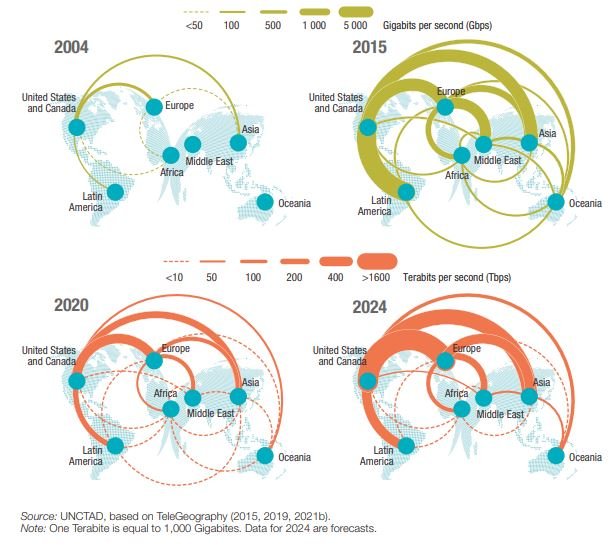a deep dive into the development and policy implications of
cross-border flows of digital data.
RECENT TRENDS IN THE DATA-DRIVEN DIGITAL ECONOMY
Digital Economy: Digital data and cross-border data flows play an increasingly important role in the world economy, with major implications for the attainment of the Sustainable Development Goals. Given the high speed at which data traffic is expanding – both domestically and internationally – there is an urgent need to improve the understanding of the dynamics of cross-border data flow, to enable the formulation of adequate policy responses at national as well as international levels. This first chapter sets the stage for the Report, by providing a definition of data and highlighting some of their key characteristics. In the context of the global data value chain, it then
examines recent trends in digital technologies of particular relevance to data and cross-border data flows. It underlines that the data-driven digital economy is characterized by major-power imbalances between and within countries; these are reflected in the unequal levels of readiness among countries to harness data and their flows across borders for grohttps://reportsrecords.com/digital-india-opportunity/wth and development.



The expansion of cross-border data flows has led to enhanced interest among Governments in complementing their national legislation with commitments at the regional and international levels. To date, however, finding consensus has proven difficult, reflecting different priorities and positions of countries. Even among G20 countries, there are contrasting views on both substance and process. While regional and international discussions on data flows initially focused on the need to protect privacy, more recently the emphasis has shifted to the trade area. A rising number of bilateral and regional trade agreements now include clauses related to data and digital trade, and negotiations are also underway in the context of the Joint Statement Initiative on e-commerce at the World Trade organization. The chapter shows that international and regional approaches to regulating cross-border data flows are either too narrow, focusing only on aspects such as trade or privacy, or too limited geographically, as in the case of regional approaches. It emphasizes that, in order to address data flows in a holistic and multidimensional manner, global rules in this area will need to go beyond trade, and consider both economic and non-economic dimensions of data.








